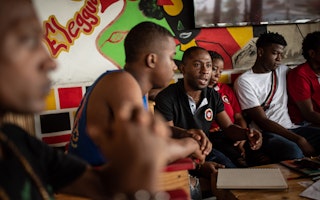Remembering Peter Bell
By Chris Stone

Peter Bell, who died on April 4, lived a modest and relatively private life. Yet he did more to shape American philanthropy over the last five decades than perhaps any of his contemporaries.
In the 1960s, as a young program officer in the Ford Foundation’s Brazil office, Peter pushed his superiors to support activists opposing the country’s military regime. He met resistance at first, but gradually won over the foundation’s leadership, helping to establish Ford as a champion of democracy and dissent against dictatorship. Peter was eventually promoted to run the foundation’s office in Chile, where he again used its resources to support victims and opponents of the Pinochet regime.
For his efforts, he was branded “a suspicious person” by Pinochet’s government, and was asked to leave the country by the U.S. ambassador. He complied, but left with a strong belief in the powerful role philanthropy could play in the region. He would go on to serve as the first president of the Inter-American Foundation, established to undo the stained reputation of the U.S. government in Latin America.
By the time I met Peter in the late 1980s, he had assumed the presidency of the Edna McConnell Clark Foundation. At Clark, as at Ford, Peter pushed philanthropy beyond its comfort zone for the sake of justice. There, he took a program placing foster children in adoptive homes and built it into a multistate effort to reform child welfare—demonstrating the value of intensive family preservation services to reduce the need for foster care placements in the first place. In less than a decade, the foundation had helped more than 30 states adopt its Homebuilders model, which sent specially trained workers into homes to help families learn skills to protect their children.
Similarly, he transformed Clark’s Program on Justice into an effort to reform sentencing laws, inviting state officials to apply for the foundation’s financial and technical assistance to reverse the runaway growth of prison populations. His efforts helped cement Clark’s reputation as a small foundation that punches well above its weight.
Critics of the Clark Foundation argued that reforming huge government systems was beyond the abilities of any foundation and was indeed an inappropriate role for philanthropy in a democracy. But Peter had a different view of the role foundations play. Neither Ford in Latin America nor Clark in the United States could correct the missteps of governments—whether dictatorships or democracies. But they could use their private wealth to promote alternative visions of civic life.
They could be beacons of justice and dignity in a complex world of compromise, conflict, and corruption. Peter’s philanthropic projects set standards for good government, human rights, and justice, engaging hundreds of reformers and activists in the work, and inspiring countless more.
Peter left the Clark Foundation in 1995 to take up the presidency of CARE, whose board he had chaired for several years. After a decade there, and a short stay at the Carter Center, Peter joined me at the Harvard Kennedy School where he served as a senior research fellow at the Hauser Center for Nonprofit Organizations. While there, Peter led the NGO Leaders Forum, which brought together the chief executives of the largest humanitarian organizations in the United States, including CARE, World Vision, Oxfam, Save the Children, and more.
One of our last collaborations was to bring many of these leaders together with leaders of the International Criminal Court and those in civil society pursuing international justice to discuss practical ways to advance peace, justice, and safety in tandem in some of the world’s most violent conflicts [view clip below]. It was classic Peter: success was highly unlikely except perhaps over the long-term, but the stakes were high, the principles were clear, and Peter knew there were practical steps we could take now that would move us forward.
A few years ago, one of Peter’s successors as head of the Ford Foundation’s office in Chile, himself from Argentina, reflected back over the changes at Ford since Peter’s day. “The Ford offices in Latin America used to be run by these men from the U.S. with degrees from Harvard and Yale. Those days are gone, and now the heads of these offices are from the region. The change was absolutely right. We know the region far better,” he explained. “But we don’t know the world like they did, and I think we lost something with that change.” Indeed, with Peter’s death, the loss seems especially deep.
Until December 2017, Chris Stone was president of the Open Society Foundations.


